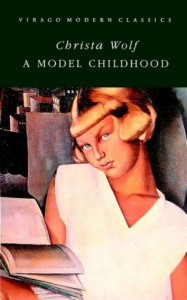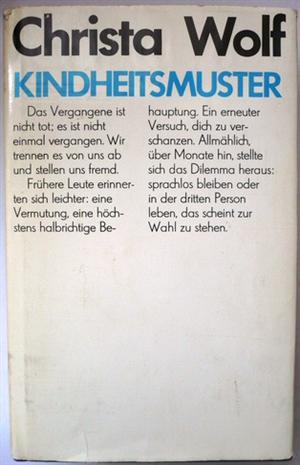

When Christa Wolf set out to novelize her childhood during National Socialist days, in Landsberg (East Prussia), she didn't just narrate the experiences of young "Nelly Jordan". No, the story is incessantly interrupted, and commented on, by an account of an alter-ego of the author revisiting Landsberg (now, as part of Poland, renamed Gorzów) in 1971, writing the book, and struggling with memory. The intellectualizing and distance thus created is undoubtedly necessary for the author's purpose; for me, though, it turned reading the book into a bit of a slog. I wasn't in the mood for something quite as dry and dense as this. And the author's analytical attitude toward Nelly (she actually thinks she is being invasive in examining the child so closely, and says that she is doing her a wrong but by necessity) forbids close emotional identification with her. For that reason two other characters (who are also investigated but not with such fierce completeness), Nelly's mother Charlotte and the writer's daughter Lenka, struck me as more "pleasant" to read about -- that is, they're interesting without also having something repellent about them as Nelly is made to have.

I read the novel in German, referring to the English translation now and then. I was dismayed to notice that it's a very poor translation. Not just that the translator made the questionable choice to often replace German proverbs and cultural artifacts with American "equivalents"; for example, you may be startled to find a schoolchild reciting the Mother Goose rhyme "To market, to market..." -- in the original it's a rhyme beginning "My mo-, my mo-, my mother sent me here..." (and by lack of contrast we'll miss noticing that Lenka, modern child, actually does sing songs in English). But more, the translation from the German is often extremely sloppy or wrong. Just one example: During a passage very much concerned with Nelly's relationship with her mother, we find "Nelly... gewöhnte sich das Weinen beinahe ab.... Das wurde anerkannt, übrigens auch von ihrer Mutter." translated as "Nelly... gave up crying almost for good.... This was much appreciated." Why did the final phrase, which should be "...appreciated, incidentally also by her mother", seem irrelevant?
This book could certainly benefit from a retranslation. However, even though it's an important literary monument, especially in its home country, I don't think it's the kind of thing that could ever find a very large audience elsewhere -- just not a mass market novel (not that that's a bad thing).

 1
1









